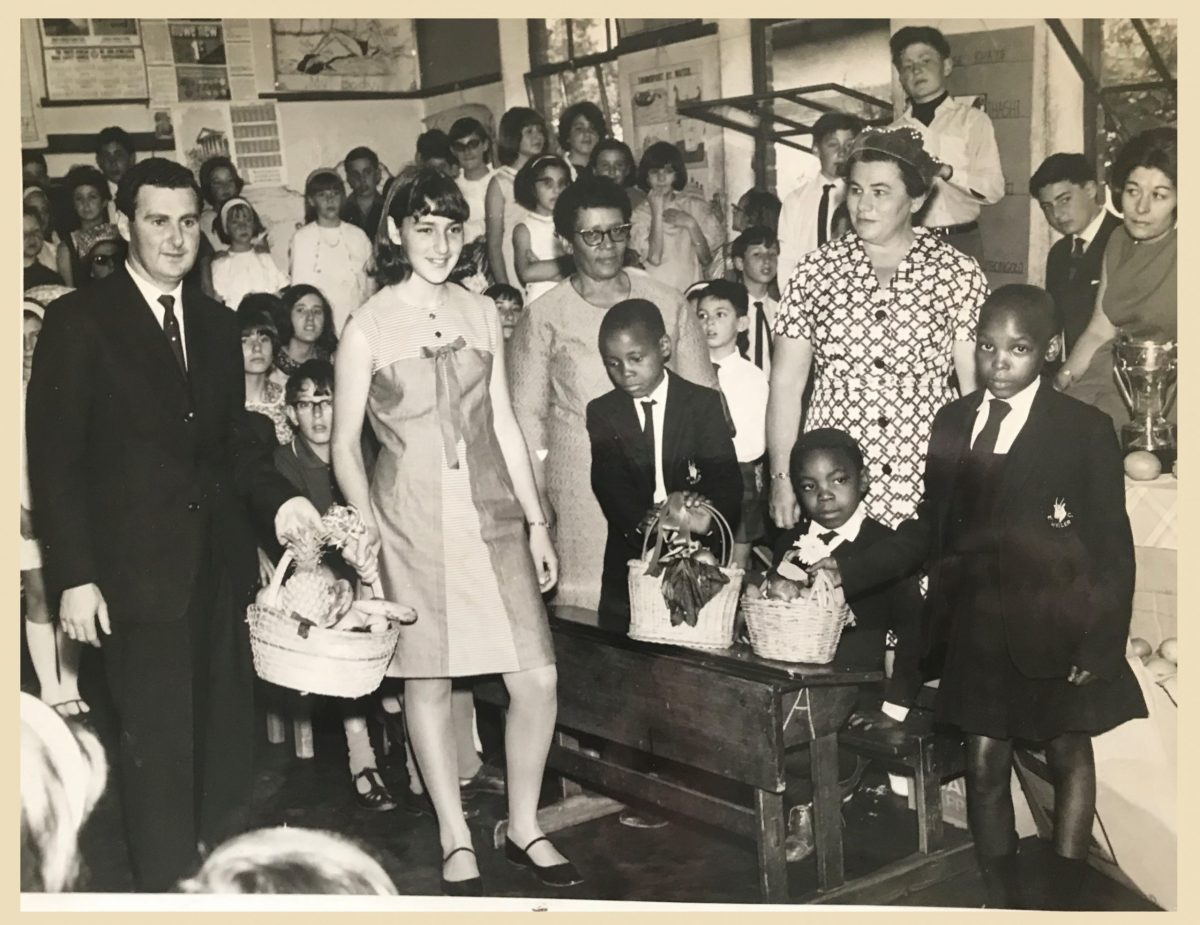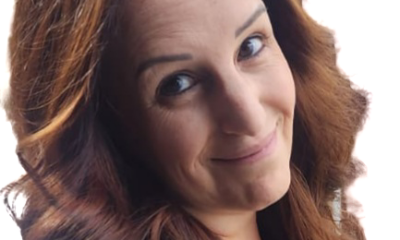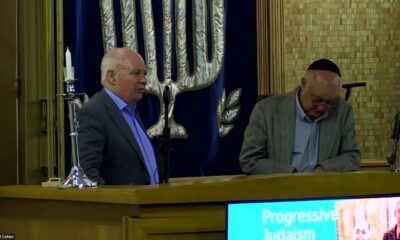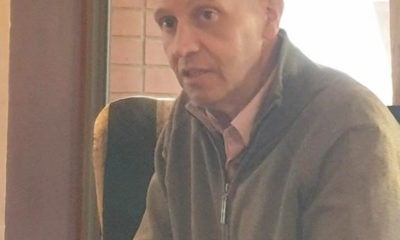
Featured Item

A progressive maverick in our tent
Published
3 years agoon
Irwin Manoim, best known for being one of the joint editors of the original Weekly Mail, has authored a book on progressive Jewry in South Africa titled Mavericks Inside the Tent. The SA Jewish Report spoke to him about it.
How did a journalist like you end up as an historian?
In the age of social media, there’s not a lot of journalism work going around for elderly male throwbacks. So, when the opportunity to do research through the Kaplan Centre at the University of Cape Town arose, I grabbed it. And I’ve really enjoyed being able to focus on a topic in depth, over a long period, rather than rushing from deadline to deadline.
Why did you focus on progressive Judaism?
The Jewish community in this country has been studied and dissected all the way down to the quality of kneidlach in the tiniest platteland dorp. There are books galore on Jewish communists and atheists. But progressive Jews? Hardly anything. It’s a giant hole in our knowledge.
What does the progressive Jewish movement mean to you, and what’s your involvement in it?
I was once the chairman of a synagogue committee, proof of the dearth of available talent. But let me make it clear that the book isn’t a public relations “rah-rah” job for progressive Judaism. It’s published by a university department and maintains a critical distance, by no means shying away from awkward controversies.
You were brought up Orthodox, what drew you to progressive Judaism?
I blame my feminist daughters. They demanded that their Batmitzvahs be exactly the same as those of boys, and that was available only in a progressive shul. For a long time, I hated it. It was very different in style. But then I came to realise that its leaders were serious people, concerned about contemporary issues, who’d given a lot of thought to the topics I’d taken for granted, and who were open to new ideas in ways I hadn’t encountered before.
Give me a quick overview of the book.
It tells the story of a charismatic young rabbi, Moses Weiler, who defies expectations by building a movement under adverse conditions in a deeply conservative community, and then manages to spread it from Cape Town to Salisbury.
He pioneers all sorts of areas: the first Batmitzvah, held in near secrecy; the first Jewish outreach to African townships; the first women on shul executives; the first interfaith dialogues. And more recently, the movement has gone places Orthodoxy can’t follow: women rabbis, same-sex marriages.
The movement starts to splutter around 1976, when the Jewish flight abroad begins; the progressives lose most of their leadership. Orthodoxy stages a come-back – Chabad steals away many members. Progressive parents send their kids to King David, where other kids tell them they aren’t proper Jews.
But the pendulum may be swinging back. The recent Kaplan Centre survey shows that if you compare paid-up shul memberships, progressive has nosed slightly ahead in Cape Town for the first time.
Are there some interesting characters in the book? If so, who are they, and why did you write about them?
The movement’s founder in South Africa was Professor Avraham Zvi Idelsohn, widely regarded as the world’s leading expert on Jewish liturgical music. He also happened to compose Hava Nagila. He had a wife in Joburg, and a mistress in Cincinnati.
His brother, Jerry Idelson, was the first leader of the movement in South Africa. He had founded a Zionist youth movement when still a teenager. He also founded the Vegetarian Society (his father was a shochet), founded the Mountain Club, was a founding member of revisionist Zionism, and a member of the first orchestra to perform for radio.
Weiler was a heroic and tragic figure. A master orator in multiple languages, he was deployed as a trouble shooter by the South African Jewish Board of Deputies whenever they had a particularly thorny issue to deal with. Then he went on aliyah, and lost two sons in Israel’s wars.
Rabbi Andre Ungar spent his childhood hiding from the Nazis in Budapest. When he arrived in South Africa 10 years later, he said he saw similar things happening here. For which the government promptly deported him.
Rabbi Arthur Super lost the use of his legs after radiographers forgot to switch off an x-ray machine. Yet he carried on, more feisty than ever, from a wheelchair.
Rabbi Richard Lampert was raided by security police after a congregant tipped them off that he had banned political books in his library. His super-alert wife treated the policemen to tea in the sukkah while she chucked the books over the garden fence.
Why do you believe this book is necessary?
To quote Professor Adam Mendelsohn of the Kaplan Centre, it demonstrates that no history of the South African Jewish community is complete without an understanding of the role of the progressive movement in pushing boundaries.
Progressive Juidaism hasn’t really taken off here the way it did in America. Why do you believe this is the case?
When reform first arrived in this country, there was fear in Orthodox circles that what had happened in America – where reform swept the country and became the dominant denomination – might repeat itself in South Africa.
So, there were concerted efforts to keep reform at bay. Initially these were fairly crude: denying access to communal facilities, planting hecklers at meetings, claiming that reform was anti-Zionist.
But then a masterstroke: the rabbis branded reform as “inauthentic”. It wasn’t Judaism at all, and therefore no reform weddings or conversions would be recognised. This tactic, which had failed in the United States, was an immediate success in South Africa. The stigma of “inauthentic” has haunted the South African progressive movement ever since, and scared away people who otherwise share similar values.
Who is this book aimed at and why?
The general Jewish public are big purchasers of books on South African Jewish history. Some people have shelves of them. Myself, for example. There is a sizeable diaspora of Jews abroad, many of whom were members of the progressive movement in the old days. Jewish historians at international universities are surprisingly fascinated by South African Jews, and are less inclined to treat progressives as marginal.
Why would someone who isn’t progressive want to read the book?
To quote David Saks of Jewish Affairs, it’s an entertaining read. It also has pictures. For those who aren’t big readers, there’s the Jewish Museum exhibition, which has slimmed down my 500 pages into two dozen picture panels and lots of videos.
Where does one buy the book, and how much does it cost?
There’s a website at www.progressivejews.co.za which contains additional material and photographs (i.e. a taster for the book) and also points readers to the Juta website which is selling the book online. There will be a book launch on Zoom on Thursday, 12 November, at 18:00, all welcome, at https://beiteman.link/bezoomclub.










